Author: ktoxqui
Tenants rally for rent freeze ahead of Rent Guidelines Board’s Bronx public hearing

Over 100 people turned out in the Bronx to march and rally in favor of a rent freeze before the Rent Guidelines Board’s public hearing on June 12.
The group, including some seniors using canes and walkers, marched from Bronx Borough Hall to Hostos Community College, where the RGB would hear five hours of testimony from the public.
Several local groups were represented at the rally, including the Bronx Defenders, the Bronx Leadership & Organizing Center (BLOC), New York Communities for Change, New York State Tenant Bloc, Banana Kelly Community Improvement Association and Community Action for Safe Apartments (CASA) New Settlement, all calling on the RGB not to increase rents for the city’s 2.4 million rent-stabilized tenants.

As they marched, the group chanted, “Fight, fight, fight! Housing is a human right!” and “People, not profit!” and some passing drivers in rush hour traffic honked their horns and waved in support.
The rally came as the mayor-appointed RGB is set to vote later this month on whether to increase the rent, and if so, by how much. The board’s proposed increases range from 1.75% to 4.75% for one-year leases and 3.75% and 7.75% for two-year leases, starting this October.
Many property owners argue that an increase this year is necessary to keep up with the costs of building operations, which have gone up 6.3% since last year.
To owners, a rent freeze is “unrealistic and nonsensical,” said Ann Korchak, board president of Small Property Owners of New York, in a statement last month. “The city doesn’t freeze our property taxes and water rates. Much of the rent-stabilized housing stock is already in severe distress, and operating, repair and maintenance costs are constantly increasing. A rent freeze will result in foreclosure and abandonment, and push tenants into housing instability.”
But tenants who rallied say that no increase is acceptable, arguing that landlords’ profits have been rising.
Mercedes Escoto, a retired city social worker who has lived in her rent-stabilized apartment in Highbridge for 16 years, told the Bronx Times that a rent freeze is her number one priority.
Escorto said between the high cost of food, medication and other necessities, she hasn’t been on a vacation in 15 years. She also said she has been forced to cover expenses that should be the landlord’s responsibility, such as replacing a broken refrigerator and exterminating bed bugs.
As the RGB has increased rents each of the past three years under Mayor Eric Adams, “What happened to all the money I paid?” Escoto said.

Another Highbridge resident, Nereida Figueroa, said she’s having a hard time making ends meet as a single parent of two children. She often works up to 60 hours per week just to cover expenses.
“It’s hard,” she said. “It affects me and my community.”
Figueroa is currently battling her landlord to fix water leaks in the bathroom ceiling, which she said has weak spots where the pipes show through.
But beyond her own situation, Figueroa expressed concern about how rising rents would affect her Bronx neighborhood as a whole. Increasing the rent would likely lead to more homelessness and displacement of people like her in favor of “fancy people,” she said.

Addressing the large crowd that assembled outside Hostos before the hearing, City Council Member Pierina Sanchez, who chairs the Committee on Housing and Buildings, said that building owners should seek funds from the government — not their tenants — if they face difficulty covering operating costs.
“When people are struggling, you don’t find the weakest and try to fix the problem on their backs,” she said.
Public Advocate Jumaane Williams said a rent freeze is “the morally right thing to do right now.”
Despite RGB rent increases under the Adams administration totaling 9%, he said many owners don’t seem to have used the funds to improve the condition of their buildings.
“The housing stock has only gotten worse,” only “adding insult to injury” for tenants, said Williams.
Bronx Borough President Vanessa Gibson spoke at the hearing and said the rent stabilization system is “one of the cornerstones of affordable housing that we have left in our city.”
Gibson called on the board to freeze the rent, saying the proposed increases would have a “devastating effect” on many Bronx residents, especially seniors, veterans and people with disabilities.
Gibson said the board should “absolutely reject these proposed increases so that we can keep all these residents living in the Bronx,” to applause from those in attendance.
She also asked the board to listen carefully to tenants throughout the hearing. Every day, “I get the calls” from people complaining about mold, pests, landlord harassment and discrimination, said Gibson. “The Bronx deserves better, and we need your help.”
Originally published on By Emily Swanson | Bronx Times
Rent Guidelines Board trims hike, but Bronx pushback grows: ‘Not far enough’

Bronx tenant advocates say the city’s Rent Guidelines Board (RGB) didn’t go far enough Tuesday when it slightly lowered proposed rent hikes for two-year leases but ignored calls for a full freeze.
The board, which sets allowable rent increases for nearly 1 million rent-stabilized apartments citywide, voted 5–3 to slightly revise its preliminary proposal for two-year leases—lowering the range from 4.75%–7.75% to 3.75%–7.75%. The proposed hike for one-year leases remains unchanged, between 1.75% and 4.75%.
RGB Chair Doug Apple said the revision came in response to public testimony about the widening gap between renters’ incomes and the city’s rising cost of living.
But Bronx housing advocates say the adjustment is too modest to make a difference for the borough’s struggling tenants. Groups like Community Action for Safe Apartments (CASA)-New Settlement have held rallies, protests, and town halls calling for a total rent freeze amid New York City’s housing and affordability crisis.
“This decision does not go nearly far enough,” said CASA tenant organizer Joanne Grell in an interview with the Bronx Times. “People are already being forced to choose between paying rent or buying groceries and medication.”
Grell cited the RGB’s own 2025 Income and Affordability Study, which found that 36.7% of Bronx residents spent at least half of their income on rent in 2023.
On Sunday, CASA co-hosted a mayoral candidate forum focused on housing justice, alongside four other housing nonprofits and City Council Member Pierina Sanchez of District 14. The forum, aimed at highlighting tenant concerns in the Bronx, featured appearances from mayoral hopefuls State Sen. Zellnor Myrie and Michael Blake—both of whom pledged to appoint RGB members who would support a rent freeze.
The mayor picks all nine members who sit on the board.
So far, candidates including Blake, Assembly Member Zohran Mamdani, and State Sen. Jessica Ramos have publicly committed to appointing RGB members in favor of the freeze. City Council Speaker Adrienne Adams, Comptroller Brad Lander, and Myrie have also voiced support for the idea.
“Tenants are not going to have it anymore with the RGB or the mayor who has repeatedly raised our rents four times in the past four years,” said Grell. “We’re not going to accept anything less than a 0% rent increase.”
Council Member Sanchez echoed that sentiment in a statement to the Bronx Times, warning that even a scaled-back increase would place thousands of Bronx tenants at greater risk of displacement.
“Any rent increase will only further push New Yorkers out of their homes,” Sanchez said. “I urge the Rent Guidelines Board to continue listening to tenant feedback ahead of their June 30 vote and to prioritize stability for renters.”
The RGB will hold a series of public hearings across the city before its final vote. The Bronx hearing is scheduled for Thursday, June 12 at 5 p.m. at Hostos Community College’s main theater in the South Bronx. Residents must register and show up in-person to testify, but can watch the hearing virtually via the RGB’s YouTube channel.
Originally published on By Ethan Marshall and Sadie Brown | Bronx Times
Bronx Times | CM Stevens presents $100K check to New Settlement Apartments to support youth programming
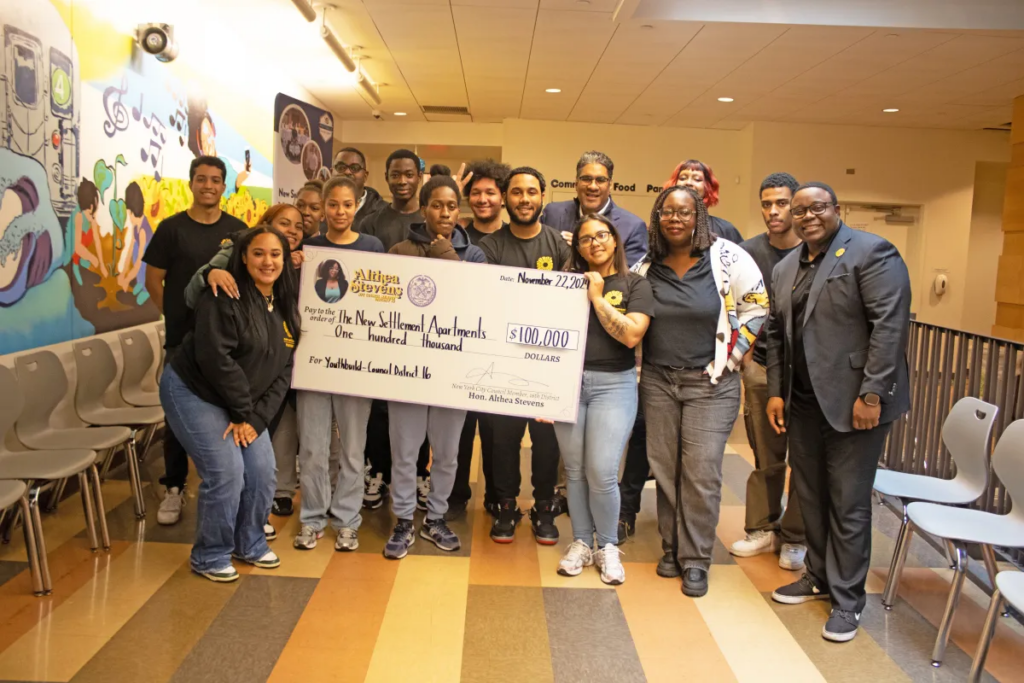
New York City Council Member Althea Stevens presented a $100,000 check to New Settlement Apartments, which are located in the Mount Eden section of the borough, for enhancements to its YouthBuild program on Friday, Nov. 22.
YouthBuild is a community-based pre-apprenticeship program that provides job training and educational services for opportunity youth between the ages of 16 and 24 who did not earn a secondary diploma from school.
Notable attendees at the check presentation included YouthBuild Program Director Roman Woodson, New Settlement Executive Director Rigaud Noel and local YouthBuild participants.
During the presentation, Stevens, who also chairs the council’s Committee on Children and Youth, talked about how Bronx youth need different options and pathways to success. She pointed to YouthBuild as being one of these essential pathways.
Woodson discussed just how much of an honor it has been to be able to help youths overcome challenges to achieve an education. Additionally, he said the skills these kids are learning can help them accomplish great things.
Noel said Stevens’ check, funded by taxpayers, reflected her passion and dedication to helping the young people in the Bronx community. He thanked her for providing the community with the opportunity to provide much-needed resources through this donation.
Bronx native and YouthBuild participant Analis Nunez said her mother placed her in the program after she dropped out of school. She said the program has made her feel at home while also providing much-needed assistance.
Another YouthBuild participant, Christopher Williams, 18, talked about coming to the Bronx from Ghana and his mother sending him to YouthBuild. The program has helped shape him into who he is today and given him a vision of what he wants to do in the future.

Both Nunez and Williams expressed their thanks to Stevens for the contribution, which will help those in YouthBuild better themselves.
Originally published on By Ethan Marshall and Jewel Webber | Bronx Times
Bronx Times | Bronx tenants rally after two weeks without cooking gas, alleging years of neglect

Frustrated tenants at two rent-stabilized buildings in Claremont rallied on Tuesday to protest their landlord, demanding action after enduring two weeks without cooking gas.
The gas cutoff marked a breaking point for tenants, who accuse building owner David Tennenbaum of years of dangerous neglect and mismanagement.
Tenant Sandro de la Cruz, who lives in one of the two affected buildings on Findlay Avenue, said that the situation with the gas has forced him to find other ways to feed his family.
“We pay rent every month and my family has always kept costs down by cooking,” said de la Cruz. “Now we have to continue paying rent and also buy food in restaurants. It’s unfair, and with the holidays right around the corner I’m starting to worry.”
Tennenbaum was ranked as number two on the 2023 NYC Worst Landlords list by Public Advocate Jumaane Williams. The two Findlay Avenue buildings have a combined 41 open HPD violations and are flagged – along with 20 other buildings in Tennenbaum’s portfolio – on the worst landlords watchlist. All but three of those buildings are located in the Bronx.
But it’s not just the lack of cooking gas that tenants are fed-up with. They cite some of the most hazardous open HPD violations, such as mold violations, roach infestations and lead based paint exposures.
Abdolie Bah, a tenant, said that Denali Management, the company owned by Tennenbaum and responsible for building upkeep, has been unresponsive.
“The super never comes to make repairs, and you can’t get in touch with anyone at the management office,” said Bah. “There are probably more rats in this building than people, always running through the walls at night. The gas is a problem now, but we’ve had plenty of other problems in the past.”
Tenants in another one of Tennenbaum’s buildings on East 169th Street filed a lawsuit in February against Denali Management. They allege many of the same problems, such as harmful exposure to lead paint, vermin and roaches, plus an elevator that’s always broken.
Residents at both sites have support from New Settlement’s membership-driven tenant organizing project, Community Action for Safe Apartments (CASA).
A community leader with CASA, Randy Dillard spoke at Tuesday’s rally.
“Nobody should have to live like this, with tiny electric stoves and no communication from the landlord,” Dillard said. “We’re here to fight with you, and to make sure you’re able to stay in your homes safe and sound.”
Denali Management and Tennenbaum could not be reached for comment.
Originally published on November 14, 2024 By Sadie Brown | Bronx Times
Norwood News | The Bronx Talks Housing
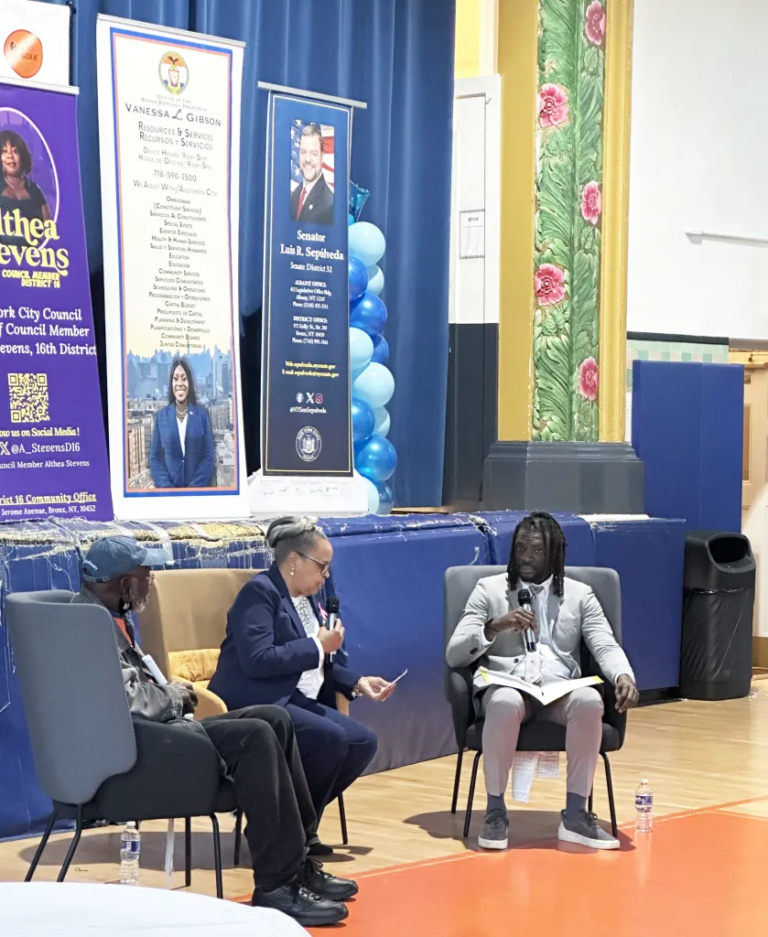
This is an extended version of the story featured in the latest Norwood News print edition.
Bronx elected officials from all levels of government, led by District 16 City Council Member Althea Stevens, united to host the 7th Annual Housing Conference at the Reverend T. Wendell Foster Recreation Center in the Concourse section of the borough on Thursday, Oct. 3.
According to data from the New York State Comptroller’s office, the low percentage of home ownership in New York is driven by the high share of multi-family housing in New York City, where about 40 percent of the population resides. “Homeownership rates are as low as 20 percent in The Bronx and 24 percent in Manhattan,” Thomas P. DiNapoli, state comptroller said. That being the case, the conference aimed to provide tenants with vital information on tenant protection rights.
“The reality is deepening in the housing challenges that our community faces daily, but today, we’re taking an important step towards moving forward,” Stevens said. “This conference is about more than how; it’s about creating a space where our community can come together and speak directly to agencies and elected officials.”
The councilwoman, who represents the Bronx neighborhoods of Morrisania, Claremont Village-Claremont (East), Concourse-Concourse Village, Highbridge, Mount Eden-Claremont (West), Yankee Stadium-Macombs Dam Park, Claremont Park, University Heights (South)-Morris Heights, and University Heights (North)-Fordham, added, “I think it’s important for us to reflect on how far we’ve come, but also understand we still have a real long way to go. So, this is one of those things we have to make sure to continue to fight on.”
Conference partner elected officials included Bronx Borough President Vanessa L. Gibson, Congressman Ritchie Torres (NY-15), who represents a large section of borough stretching from the northwest to the South Bronx, State Sen. Luis Sepúlveda (S.D. 32), who broadly represents Claremont Village, Morrisania, Forest Houses, Longwood, West Farms, Crotona, Tremont, Mt. Hope, Mt. Eden, and Woodstock, Assembly Member Chantel Jackson (A.D. 79), who broadly represents Concourse Village, Melrose, Morrisania, Claremont, Belmont, and East Tremont, and Landon Dais (A.D. 77), who broadly represents Highbridge, Morris Heights, Mt. Eden, and Concourse.
“Something that we’re all champions for is ensuring that our housing stock for our community members, that it is sustainable, that it is affordable, and that it is built properly for them,” said Dais. “Most importantly, we want to make sure that your kids and your family secure and stay in the community that they’re from, and stay in the community they want to grow up in.
Participating organizations at the conference included Community Action for Safe Apartments (CASA), The Legal Aid Society, NYC Department of Buildings (DOB), NYC Department of Housing, Preservation & Development (HPD), NYC Department of City Planning (DCP), NYC Department of Finance, NYS Division of Human Rights, Bronx Fountain House, and Arriva Bank. (“Casa” means house in English.)
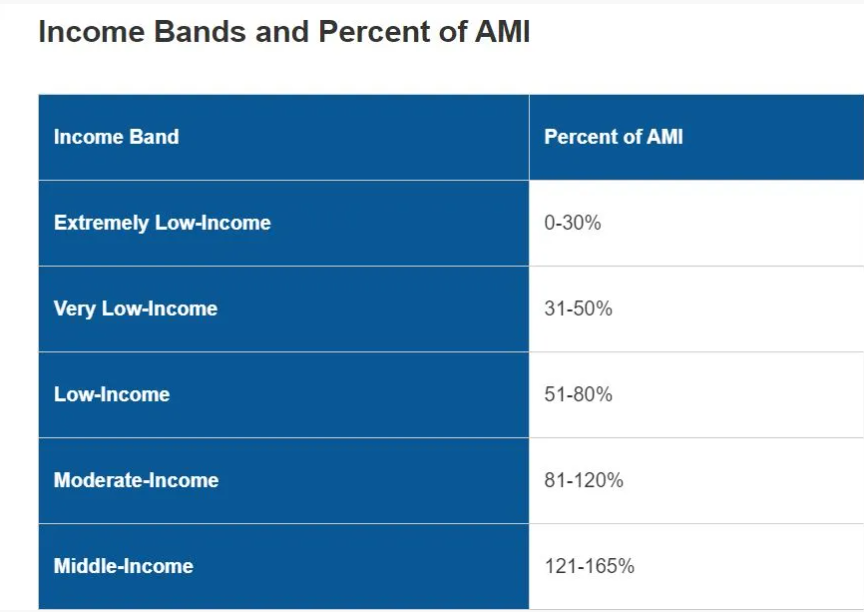
The conference allowed members of the community the opportunity to speak both with these agencies, and with representatives of elected officials to obtain resources and information on housing.
Of course, of major concern to most tenants is affordability. HPD officials say housing is considered affordable if it costs about one-third or less of what the people living in the local area earn. Income eligibility and rent for City-financed affordable housing projects are based on a measure called Area Median Income (AMI).
The AMI for all cities across the country is defined each year by the U.S. Department of Housing and Urban Development (HUD). The 2023 AMI for the New York City region is $127,100 for a three-person family (100% AMI). We’ve asked HUD if it could provide the AMI for a single person. We did not receive an immediate response.
HPD’s most recent housing lotteries, described as affordable, seem anything but. Units at 114 East 198th Street in Bedford Park, are targeted at residents earning 130 percent of the AMI, ranging in eligible income from $105,223 to $181,740.
At 130 percent of the AMI, there are 17 studios available with a monthly rent of $3,069 for those on incomes ranging from $105,223 to $161,590, and three one-bedroom units with a monthly rent of $3,253 for residents on incomes ranging from $111,532 to $181,740.
Units at 368-372 East 194th Street in Fordham Manor are also for residents earning 130 percent of the AMI, ranging in eligible income from $110,880 to $218,010. There are six one-bedroom units available with a monthly rent of $3,234 for residents on incomes ranging from $110,880 to $181,740, and a two-bedroom unit with a monthly rent of $3,811 for those on incomes ranging from $130,663 to $218,010.
Meanwhile, units at 3178 Villa Avenue in Bedford Park are also for residents earning 130 percent of the AMI, ranging in eligible income from $104,640 to $161,590. There are 21 studios available at a monthly rent of $3,052.
Units at 3056 Decatur Avenue in Norwood were also recently up for grabs for residents earning 130 percent of the AMI, ranging in eligible income from $82,286 to $181,740. Three one-bedroom units at a monthly rent of $2,400 were available.
Units at 2621 Grand Avenue in University Heights were again for residents earning incomes at 130 percent of the AMI, ranging in eligible income from $84,755 to $181,740. There were two studios available with a monthly rent of $2,472 for residents on incomes ranging from $84,755 to $161,590; and nine one-bedroom units with a monthly rent of $2,520 for those with incomes ranging from $86,400 to $181,740.
Meanwhile, according to the latest available district profile for Bronx Community District 7 (CD7) compiled by NYC Department of City Planning (DCP), which incorporates Norwood, Bedford Park, Fordham, Jerome Park, Kingsbridge Heights, and University Heights, around a third (30.8%) of residents living in Bronx CD7 have incomes below the NYC.gov poverty threshold.
Around 53.8% of households in CD7 spend 35% or more of their income on rent, and around 8.6 percent of the district is unemployed. Based on the 2020 Census data, of the 50,161 housing units in the district, 47,564 are occupied, while 2,597 are vacant.

According to Bronx Community Board 7 (CB7)’s 2025 Statement of Needs for the district, CD7 is in need of quality, mixed-income housing. “Housing accommodations continue to be one of the primary issues facing district residents,” the board wrote to City officials. “While the district has some of the most affordable, private market rental housing in the city, many rent-stabilized and rent-controlled apartments are disappearing due to evictions and tenant turnover.” Click here to read our recent story for more on this.
The board continued, “To make matters worse, the district is seeing an influx of new residents who have been priced out of other neighborhoods in New York City, increasing competition for the affordable units available in the district. There is also a prevailing feeling in our district that we have received a disproportionate share of supportive housing developments, which serve a population that does not currently reside in the district.”
Back at the housing conference, several members of the executive board of the District 16 Tenant Advisory Council were honored by Stevens. President Mildred James, Vice President Sandra Thomas, Treasurer Gwendolyn Weekes, and Secretary Linda Kemp each received City Council citations.
Tenant advisory council members said the council provides community members with a direct platform to collaborate with local government, ensuring their voices are included in decision-making. They said the various tenant advisory councils focus on important issues for tenants like tenant rights, youth engagement, health and wellness, senior services, and multicultural initiatives.
Kemp also served as moderator for one of the panel discussions held during the conference. Panelists included CASA Leader Fitzroy Christian and NYC Department of Social Services Deputy Commissioner Jamar Hooks, who said, “Events like these are super important because many times community members don’t have access to the internet, or they’re not computer literate.”
Hooks continued, “So, these events are important to bring out the agencies to discuss what programs and services we provide, and to have direct communications with our constituents. We’re not in an ivory tower. We’re not to be isolated. We should be in a community having direct conversations with the people that we serve.”
For his part, Christian said, “What we do, or what we aim to do, is to make sure that we empower all tenants here in The Bronx to know their rights.” He added, “Statewide coalitions have come together to fight for housing because we believe that housing is a human right. It should not be a commodity.”

On Sept. 26, Bronx Council Member Pierina Sanchez (C.D. 14) introduced the Housing Rescue and Resident Protection Act (HRRPA), which overhauls the City’s Third Party Transfer (TPT) program. Sanchez said TPT, created in 1996 to rehabilitate buildings in financial and physical distress while ensuring safe living conditions and affordability for residents, came under great scrutiny following the most recent round of the program.
The councilwoman said TPT was widely described as being implemented in a way that disproportionately impacted communities of color. She said, by contrast, HRRPA is tailored to address the most distressed buildings and owner negligence. The bill proposes a specific set of reforms to the program, described as transformative, and was developed in collaboration with advocates, stakeholders, and affected New Yorkers. Sanchez said the legislation marks a significant milestone in efforts to improve housing conditions across the city.
Food and beverages were served at the conclusion of the event.
A representative from CASA announced on Oct. 25 that Yoselyn Gomez, a long-time leader at CASA and described as a fierce advocate for the community, died Sunday, Oct. 20.
“We are heartbroken, the post read, in part. “Yoselyn was a tireless and active member of our community, dedicating her life to building power and uplifting those around her. She touched so many lives, and her legacy will continue to inspire us all. We will miss her deeply and mourn alongside her family during this incredibly difficult time. Her daughter has created a Go Fund Me to help with memorial expenses. If you are able, please consider donating and sharing. Let’s honor Yoselyn’s memory by continuing her mission of unity and justice for our community.”
*Síle Moloney contributed to this story.
Originally published on October 28, 2024 By ARIEL PACHECO | Norwood News
BronxTimes | Seventh annual Housing Conference held to better inform tenants of their rights
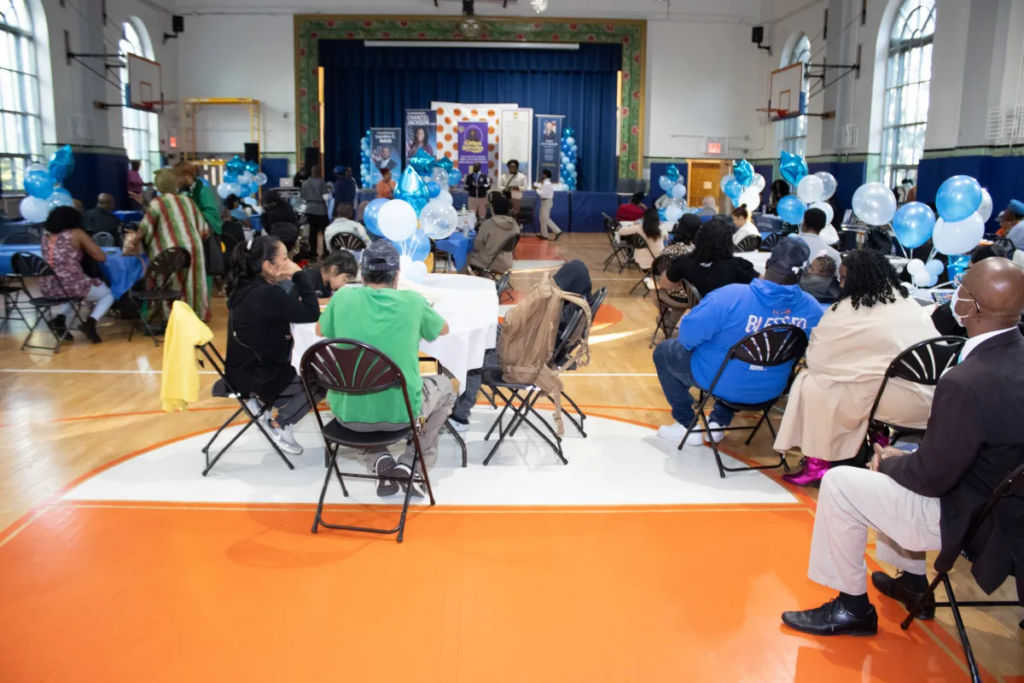
The office of New York City Council Member Althea Stevens (16th Council District) and District 16’s Tenant, Block and Neighborhood Advisory Council hosted the seventh annual Housing Conference on Thursday, Oct. 3.
The event featured information for tenants living in New York City and a panel discussion on tenants’ rights.
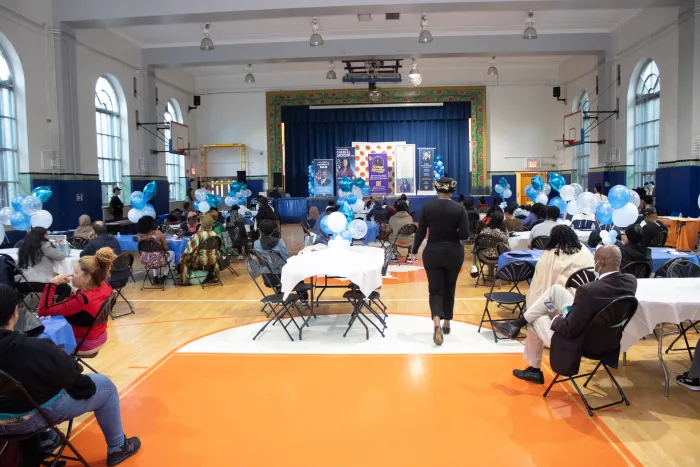
Among those who addressed attendees and answered their questions were Community Action for Safe Apartments (CASA) Leader Fitzroy Christian, District 16 Tenant Advisory Council Secretary Linda Kemp and New York City Department of Social Services Deputy Commissioner Jamar Hooks.
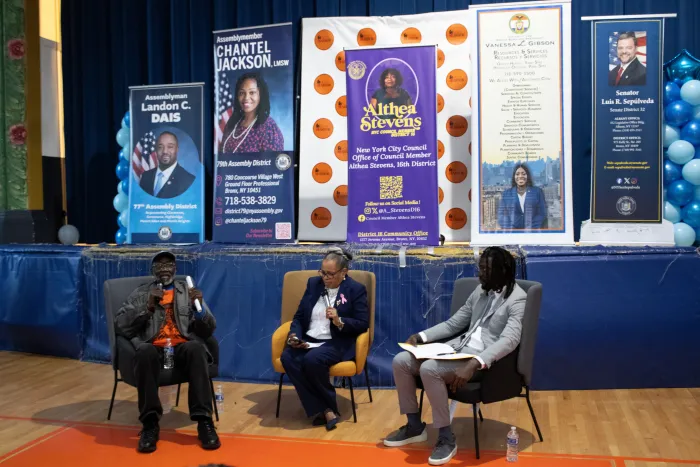
Council Member Stevens expressed her thanks to those who attended the housing conference, as well as those who helped organize it and provided much-needed resources to attendees.
Local elected officials who partnered with Stevens to put this event together included Bronx Borough President Vanessa L. Gibson, Congressman Ritchie Torres (15th Congressional District), State Senator Luis Sepúlveda (32nd Senate District) and Assembly Members Chantel Jackson (79th Assembly District), Landon Dais (77th Assembly District) and Amanda Septimo (84th Assembly District).
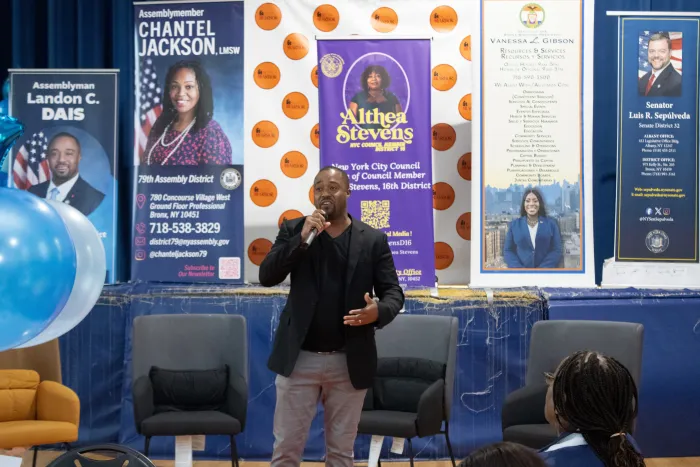
Organizations that took part in this year’s housing conference included New Settlement’s CASA program, the Right to Counsel NYC Coalition, the New York City Department of Buildings, New York City Housing Preservation and Development, the Legal Aid Society, the New York City Department of City Planning, the New York City Department of Finance, the New York State Division of Human Rights, Bronx Fountain House and Arriva Bank.
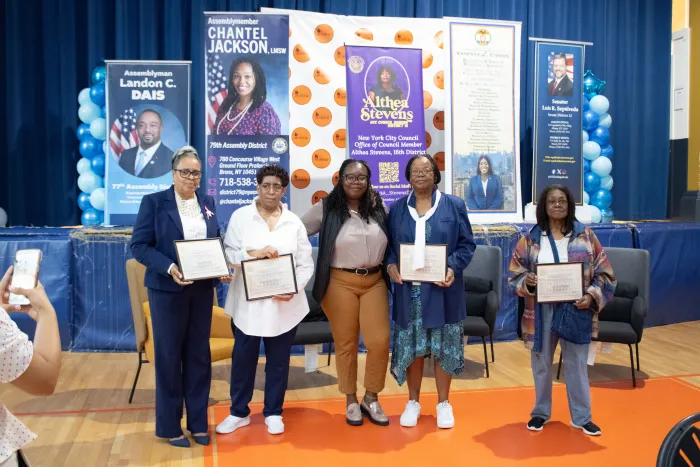
Originally published on October 7, 2024 By By Jewel Webber and Ethan Marshall | BronxTimes
Sunnysidepost | Sunnyside tenants rally against Bronstein Properties, citing building violations, retaliation and unsafe conditions


A prominent New York City landlord has come under fire by tenants who live in one of its buildings in Sunnyside, with many of them accusing the property owner of shoddy management and harassment.
The tenants at 43-17 48th St. in Sunnyside held a rally on Saturday, Sept. 21, outside their building—owned by Bronstein Properties—to draw attention to the company’s building violations, alleged retaliation against tenant organizing and illegal deregulation of rent-stabilized apartments. One tenant also alleges sexual harassment from a super.
The rally was organized the Bronstein Tenant Union, alongside member organizations from the Right to Counsel Coalition.
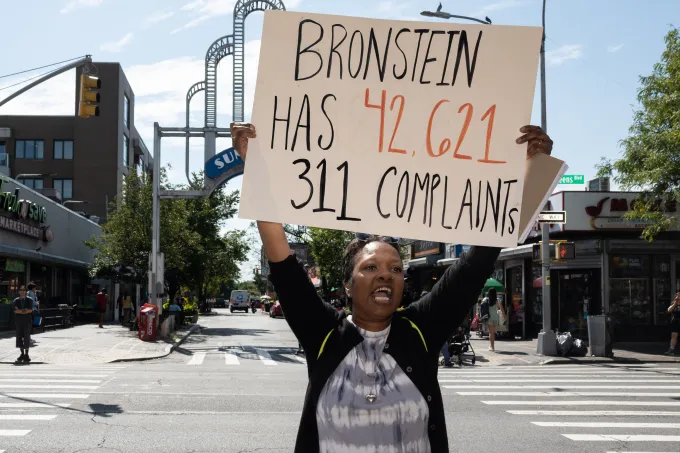
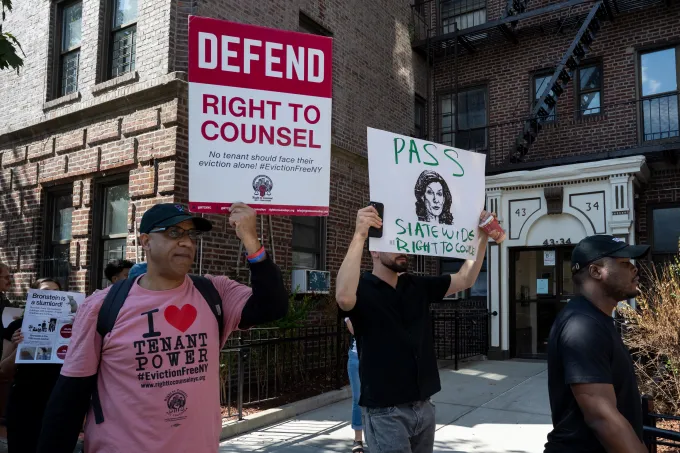
The tenants took aim at Bronstein Properties, owned by Barry Rudofsky and Scott Silverman. They noted that tenants have filed 42,616 complaints with the Department of Housing Preservation and Development (DHPD) across its 120 properties—consisting of 6,500 apartments—in New York City and Long Island throughout the years. Complaints and violations range from lack of heat, water leaks, roach and rat infestation, brown water and collapsing ceilings to mold and lead, among others.
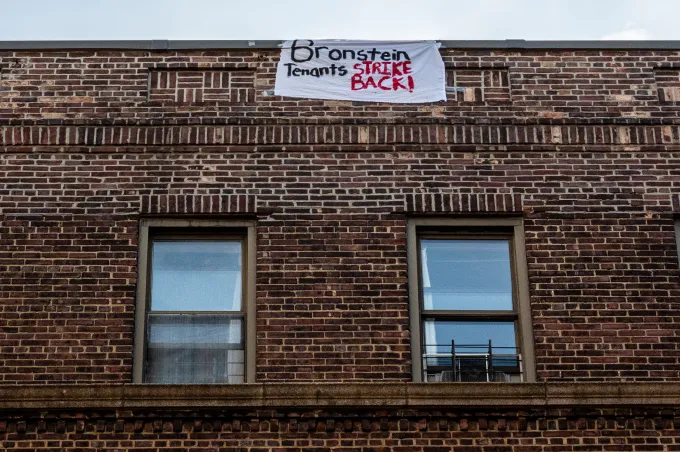
The rallygoers outside the 6-story, 95-unit Sunnyside building at 43-17 48th St. noted that Bronstein had racked up 61 complaints in the last two years and has 40 open violations, including collapsed ceilings and lead, according to DHPD. While the rally was taking place, a DHPD inspector with the Division of Code Enforcement was seen leaving the building.
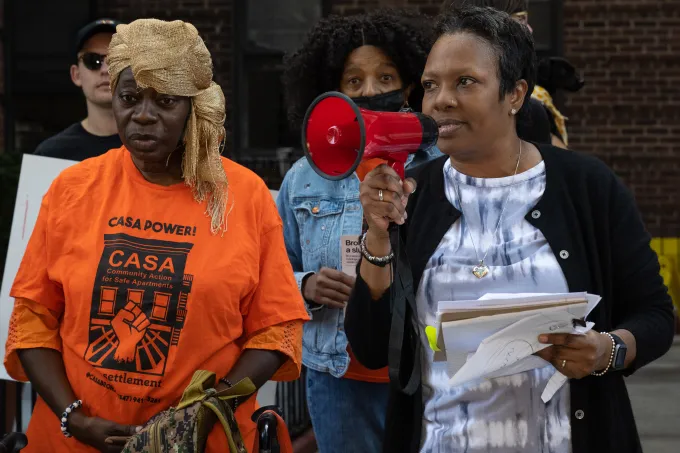
At the rally, Yvette Allen-Janis, a tenant of Bronstein Properties, told the crowd that the tenant union had reached out to Bronstein Properties via email and phone calls numerous times to address the issues. They eventually met with Bronstein Properties on Nov. 14, 2023, handing them papers with the building violations that needed to be addressed; however, “Ten months later, we are still waiting for repairs to be done,” Allen-Janis said.
One tenant described the lack of response to repair the unsafe conditions as “abhorrent.”
“We need to get timely responses and proper repairs made to our apartments so that we can continue to live in our apartments and do not have to worry about moving out because our entire bathroom ceiling fell and there was a mold in there, or that our living room apartment ceiling fell on our heads,” the tenant said, drawing chants of “no repair, no rent” from the crowd.
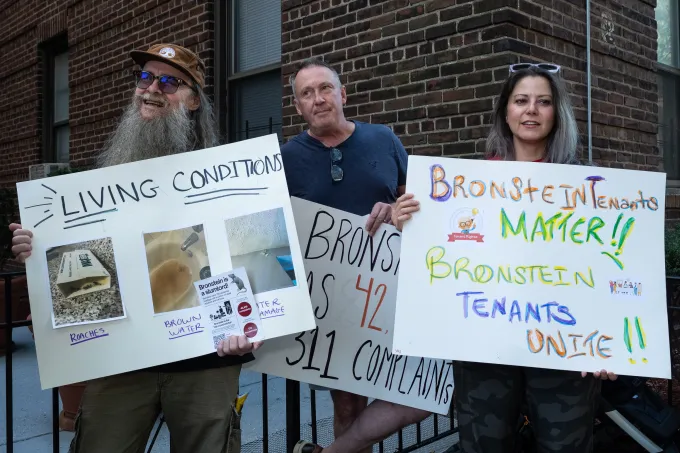
Tenants told QNS that one unit did not have gas for seven months, while another tenant had issues with mold in her apartment, forcing her to move in with friends because she is allergic to mold and could not breathe.
“It took months to get them to do anything about it,” she shared.
Another tenant expressed concern about the building’s structure and pointed out a crack in the exterior wall. She also shared with QNS that her kitchen floor was broken, and she eventually filed a complaint with DHPD to get it repaired. Another time, a century-old pipe burst in her bathroom.
“One hundred years’ worth of fecal matter that sprayed throughout our bathroom, and [Bronstein] refused to clean it up. They said it was on us to clean it up, and they left an open hole in our ceiling for a week,” she said.
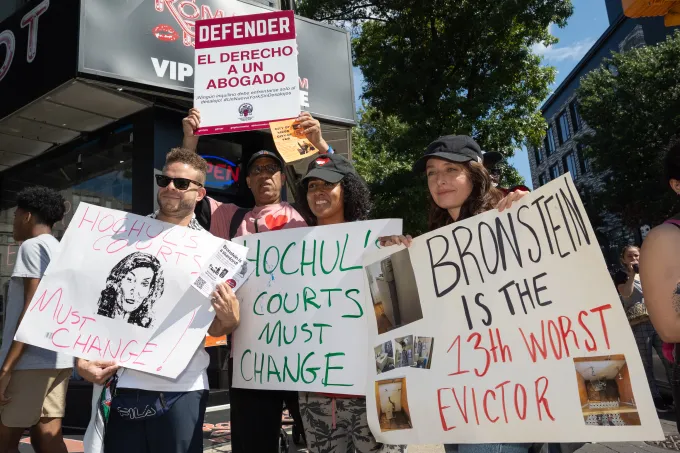
Tenants also accused Bronstein of illegally evicting tenants so the company could deregulate rent-stabilized apartments.
“We used to have more stabilization, but what they do is they evict people, and then they illegally destabilize [the apartment]. They do repairs. They’ll put in a backsplash and then charge $3,000,” said one tenant. “There’s Airbnbs here. It’s ridiculous.”
Since 2017, Bronstein Properties has evicted 176 households, and the COVID-19 pandemic worsened the eviction crisis in New York State. During the height of the pandemic, Bronstein sued 388 households for eviction between March 2020 and Sept. 20, 2021, earning the company the number 13 spot among New York City’s worst evictors during the pandemic.
Bronstein disputed many of these claims and took aim at the organizers of the rally.
“We are aware of a recent rally organized by groups that resorted to disseminating misinformation and distorting data and were frankly disturbed by the tenor of the rhetoric,” said a spokesperson for Bronstein Properties in a statement. “When groups that purport to represent our residents prioritize soundbites to push their legislative agenda rather than focus on improving New York housing, everyone loses.”
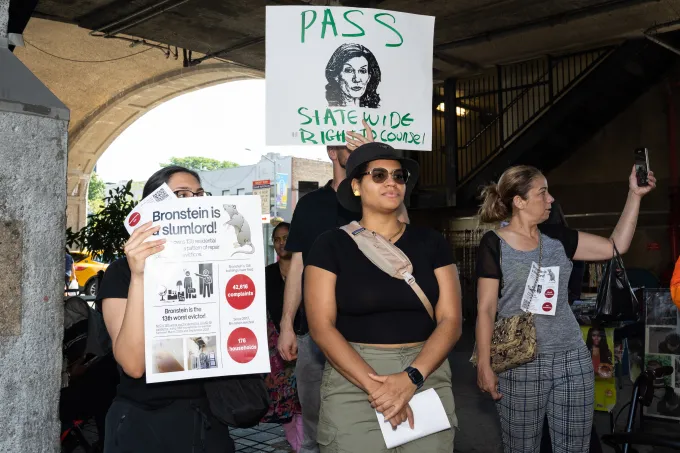
Rallygoers call for state protections
Nearly 92,000 New Yorkers are currently unhoused—New York State has the highest rate of homelessness in the country—and around 175,000 New Yorkers are facing eviction, most of them having to go through the process without legal representation due to financial distress.
Rally-goers also pushed for the passage of a slew of tenants’ rights legislation on the state level, which include:
The Statewide Right to Counsel bill (S2721/A1493), introduced by then-Assembly Member Latoya Joyner (D-Bronx) and state Sen. Rachel May (D-Central New York), would guarantee all tenants across New York State the right to a lawyer when facing eviction if it were to become law—similar to New York City’s right to counsel law, which passed in 2017. To make sure that the state court system upholds the local law, state Sen. Brad Hoylman-Sigal (D-Manhattan) and Assembly Member Linda Rosenthal (D-Manhattan) introduced the Defend Right to Counsel bill (S3254/A4993).
Another bill, the Winter Moratorium Evictions Act (S1403/A4093), sponsored by Sen. Zellnor Myrie (D-Brooklyn) and fellow Democrat, Assembly Member Dr. Anna Kelles, would prohibit evictions of tenants from residential properties during the winter months, while the Clean Hands Bill (S6769/A1853), sponsored by state Senator Kevin Parker (D-Brooklyn) and Assembly Member Rosenthal would prevent landlords from evicting tenants if they do not maintain their buildings.
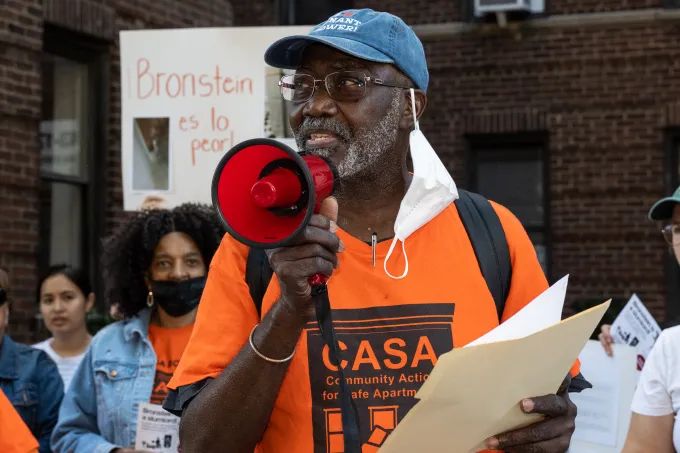
Fitzroy Christian, a tenant leader with Community Action for Safe Apartments (CASA), explained why laws like the Statewide Right to Council are important for tenants statewide.
“So that when [Bronstein] takes all of their tenants to court, we have the protection that we need to make sure we can stay in our homes, get our repairs and be able to live as human beings here in New York City,” Christian said. “The bill ensures representation for tenants in a variety of cases, not just formally eviction proceedings, and it has also an enforcement mechanism that ensures cases cannot proceed until tenants have access to their right to council.”

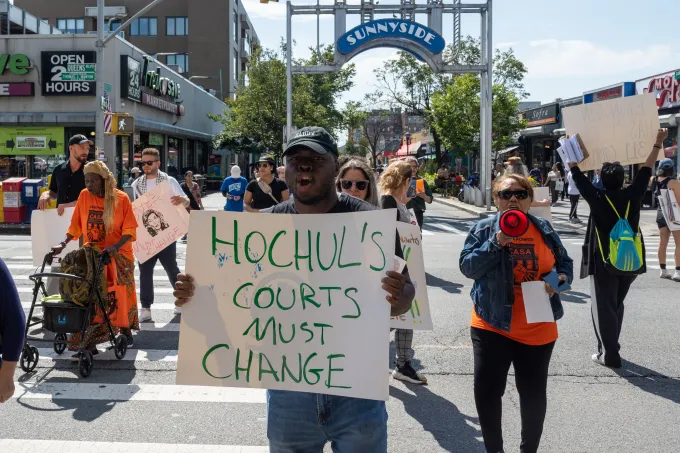
Bryan Fotino, tenant organizer at the Right To Counsel Coalition, told QNS that Bronstein Properties needed to make the repairs.
“If you’re not maintaining the buildings, you do not have the right to evict tenants,” Fotino said.
Fotino also demanded that the building supers stop interfering with tenant organizing, like tearing down flyers or preventing them from trying to talk to tenants, which is a “violation of New York Real Property Law section 230.” He shared that a super tried to prevent him from leaving the building during one tenant-organizing event.
“I was stuck in the building for like two minutes,” Fotino told QNS. “I kept trying to leave, but he kept putting his arm up. I don’t live in the building, so I get to leave, but the tenants have to deal with this harassment all the time; I really feel bad for them.”
Bronstein Properties disputes the accusations and says that it does a good job in managing its portfolio, given the age of many of its buildings.
“For over 60 years, Bronstein Properties has been proudly dedicated to resident satisfaction,” the spokesperson said. “Despite the challenges posed by New York’s aging buildings and the increased costs associated with maintaining these properties, we take great pride in maintaining them and being responsive to our residents’ needs. Any assertions to the contrary are fundamentally untrue.”
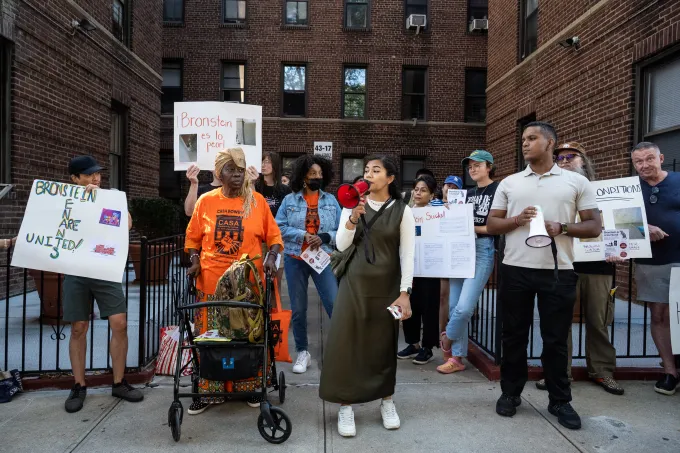
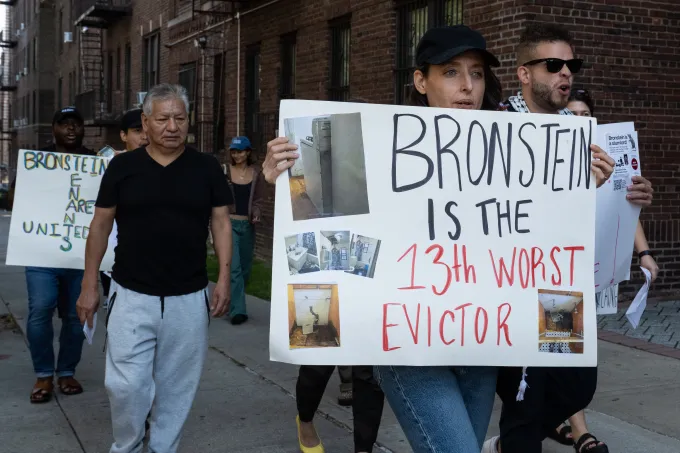
Originally published on September 24, 2024 By Gabriele Holterman | Sunnysidepost
BronxTimes | Op-Ed: Swimming resources are essential for our BIPOC communities

This summer, BIPOC Communities took tremendous losses in New York City because of the lack of knowledge in our community when it comes to swimming. Six New Yorkers have lost their lives due to drowning incidents this summer alone. Particularly, the West African community in New York City took several losses. In Assembly District 77, we have lost two members of our community to drowning. It is a shared duty to make sure that all communities are getting equal access to resources that allow them to learn how to swim.
Research based on CDC data reveals a disproportionate number of adults from the BIPOC community that lack knowledge when it comes to swimming and water safety. While 15% of adults nationwide report not knowing how to swim, 37% of Black adults face this challenge. Additionally, 55% of all adults have never taken a swimming lesson, with the numbers rising to 60% for Black adults and 72% for Hispanic adults. This disparity highlights the urgent need for affordable and accessible swimming and water safety resources in our communities.
The solution to bridging this gap to the lack of water competency is to bring our communities more affordable resources when it comes to swimming and water safety. The term water competency is used by researchers and non-profits to describes the ability to apply knowledge of water safety and survive in common situations to avoid drowning. The lack of water competency in BIPOC communities is what makes this a State of Emergency, not just nationally but particularly in New York City, especially in the Bronx.
In response to the statistics highlighting water competency issues in Assembly District 77 and the Bronx, I have made significant investments in programs aimed at increasing water safety and skills within our community. BronxWorks is a key organization providing affordable wraparound services, including swimming lessons for children, youth and adults. They offer both group sessions for kids and private lessons for adults, making water safety accessible to all. New Settlement is another invaluable resource, offering affordable swimming classes and lifeguard certification programs. Additionally, Roberto Clemente Park in the Bronx provides swimming lessons and is currently seeking lifeguards. These initiatives not only promote water competency, but also enhance employment opportunities within our community.
By expanding access to these resources, we can prevent further tragedies and ensure that every New Yorker, regardless of background, has the skills needed to stay safe in and around water. This is not just a matter of public safety; it is a matter of equity. We must continue to invest in and advocate for programs that bring water competency to our communities. Only then can we close the gap and protect the lives of our neighbors and loved ones.
Assemblymember Landon Dais represents New York’s 77th Assembly District, which is comprised of parts of Claremont, Concourse, Highbridge, Morris Heights and Mount Eden.
Originally published on August 26, 2024 by Assemblymember Landon Dais | BronxTimes
Gothamist | Low-income Bronx Families to Get Free Child Care for Young Children at 6 New Centers
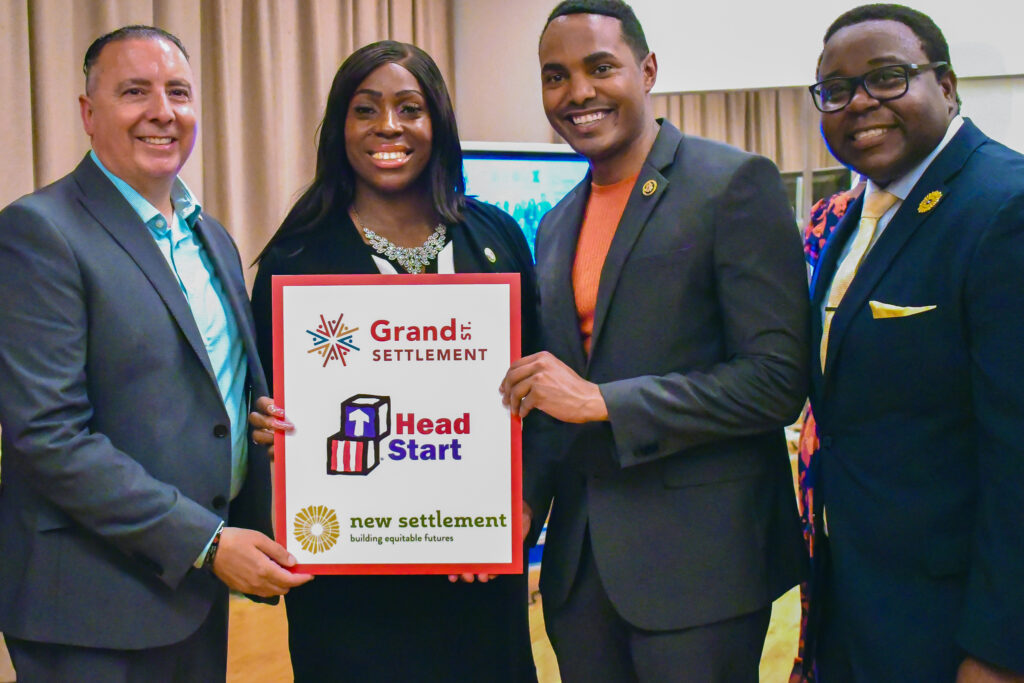
Low-income Bronx families will soon have more child care options for their young children.
Six new Head Start centers will launch in the borough, with some facilities opening as early as this year, offering families with children up to the age of 5 free, year-round care.
Grand Street Settlement, a social services provider, told Gothamist it received $18.4 million from the federal government to expand its early childhood services in child care deserts around the city. The six new Head Start sites will open in the Bronx and another in Sunset Park to serve 583 children whose families fall below certain income levels.
“When the city catches a cold, the Bronx gets pneumonia, because of the lack of resources, because of the concentration of poverty,” said Robert Cordero, CEO of Grand Street Settlement. “Our strategy is, we should take our high quality childcare services to where they are needed and to build programs that address the needs of the whole family.”
Grand Street Settlement already runs Head Start programs in the Lower East Side and Brooklyn. Cordero said families in the Bronx have five times less access to a Head Start program than families in the Lower East Side.
Head Start is a federally-funded program and offers comprehensive services for children, but also for their families, including health, mental health care, assistance with housing, employment or education.
“When we engage with families like that on the upfront, it changes the entire trajectory of their life and their family’s life,” Cordero added.
Most New Yorkers can’t afford to pay for child care despite the city’s free programs for 3- and 4-year-olds. And child care costs are among the major factors driving young families out of the city. But the problem is more acute in the Bronx, where households in Mott Haven and Hunts Point spend as much as 63% of their income on infant and toddler care, according to the Citizens’ Committee for Children of New York.
The nonprofit child advocacy group also found only 1% or less of families in those Bronx neighborhoods — where median annual income ranges from $30,000 to $43,000 — and others like Highbridge, East Tremont and Morrisania can afford to pay for infant and toddler care, based on federal affordability standards. Federal guidelines say families shouldn’t pay more than 7% of their household income to care for one child.
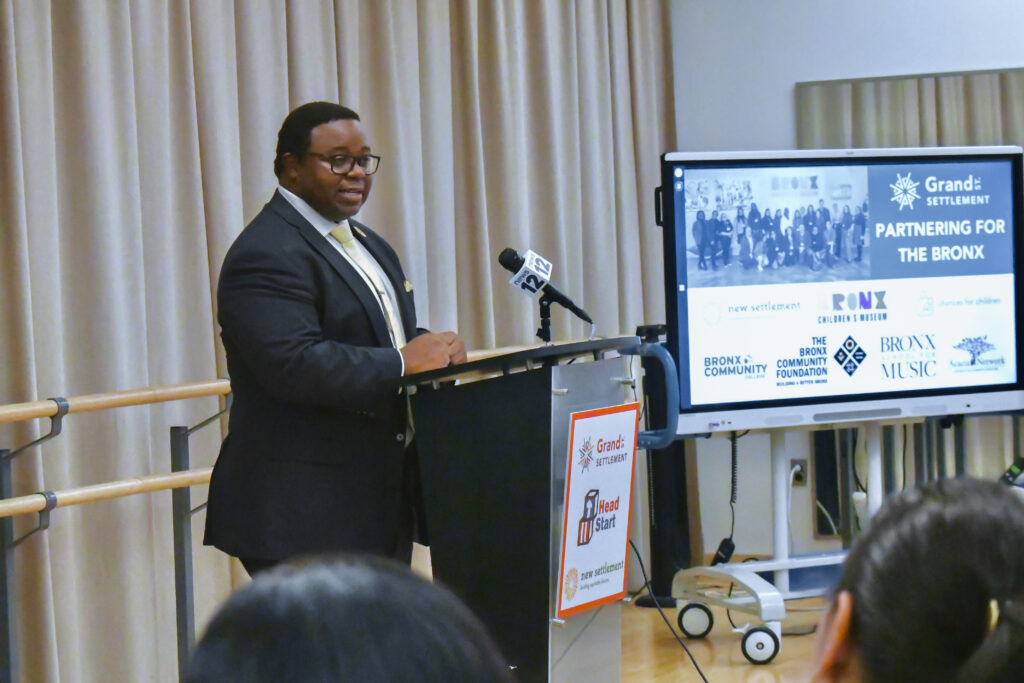
“Now families really don’t have to choose between daycare and food or daycare and paying their rent. This is really going to be a game changer for families that are really struggling,” said Rigaud Noel, executive director of New Settlement, a social services provider in the Bronx that will house one of the new Head Start programs run by Grand Street Settlement in its existing community center.
“Families really don’t get a break. And so this is really a moment of relief for them,” Noel said.
Early Head Start and Head Start is offered to children from birth up to 5 years old, with the goal of preparing them for kindergarten. Programs can be based in a center or can involve an educator visiting a child or a pregnant person’s home to work with a parent and provide services.
To qualify for Head Start, families need to earn below certain incomes. In New York City that means a two-person household earning $20,440 or less a year and a family of four earning $31,200 or less are eligible.
Willing Chin-Ma, chief operating officer for Grand Street Settlement, said while they ramp up to open all six Bronx sites, they will also partner with about two dozen existing providers that run programs in their homes or at locations and for children that would otherwise be eligible for Head Start.
That includes providing training for staff, bringing in mental health staff workers to conduct screenings, paying for teachers to go back to school and helping families apply for the services they need.
“Head Start is helping families stay in their communities, and boost with all this comprehensive wraparound service,” Chin-Ma said. “We’re targeting the areas where there are not enough child care centers.”
Chin-Ma expects all sites will be running by 2026. Families interested in applying for the new sites can reach out to Grand Street Settlement.
Originally published on July. 16, 2024 via Gothamist
